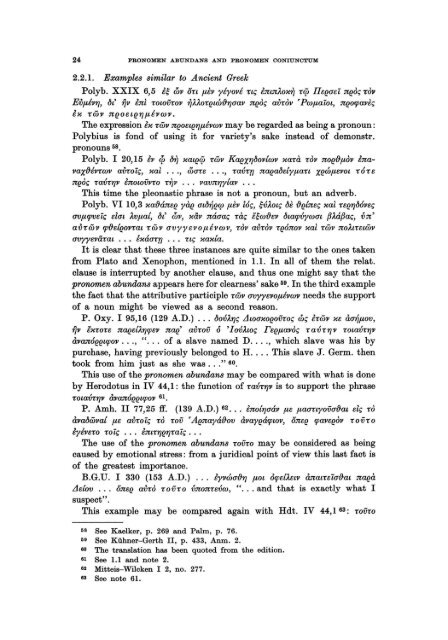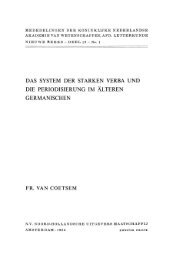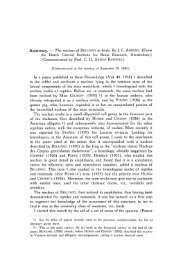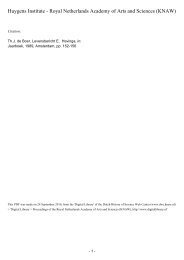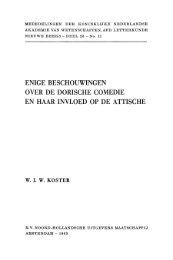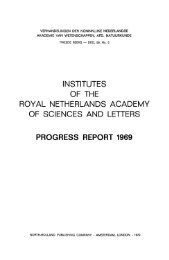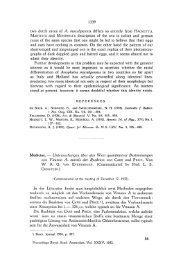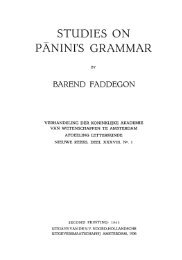Pronomen Abundans and Pronomen Coniunctum. A ... - DWC
Pronomen Abundans and Pronomen Coniunctum. A ... - DWC
Pronomen Abundans and Pronomen Coniunctum. A ... - DWC
Create successful ePaper yourself
Turn your PDF publications into a flip-book with our unique Google optimized e-Paper software.
24 l'RONOMEN ABUNDANS AND PRONOMEN CONIUNCTUM<br />
2.2.1. Examples similar to Ancient Greek<br />
Polyb. XXIX 6,5 È~ dJV Sn pb yéyové -rtç È'Jrm').o"ij np IIseaû :rreoç -rOV<br />
EVfLÉvrJ, (JL' ijv È:rrt -rOWV'l'OV IJ').Ào-retw-or;aav :rreoç av'l'ov 'PWfLaiot, :rreogJaviç<br />
È" -rwv :rreOSte'YjfLévwv.<br />
The expression È" 'l'WV :rreoSte'YjfLévwv may be regarded as being a pronoun :<br />
Polybius is fond of using it for variety's sake instead of demonstr.<br />
pronouns 58.<br />
Polyb. I 20,15 Èv qJ Mj "ate0 -rwv KaeX'YJCJovlwv "a-rà 'l'OV :rrOe{}fLOV È:rravaX{}év'l'wV<br />
av-roiç, "at ..., wau ..., TaV'l'rJ :rraeaCJslYfLan XeWfLSVOt -r6 'l'8<br />
:rreoç -rav-r'Yjv È:rrowVv-ro -rijv . . . vav:rr'Yjylav ..•<br />
This time the pleonastic phrase is not a pronoun, but an adverb.<br />
Polyb. VI 10,3 "a{}á:rrse yà(! f1t&]erp fLiv lóç, ~v').Otç CJi {}el:rrsç "at -rse'YjCJóvsç<br />
avWpvûç slat ÄVfLal, CJt' dJV, "dv :rráaaç -ràç Uw{}sv CJtacpVywf1t f3Äáf3aç, v:rr'<br />
av-rwv tp{}eleov-rat -rwv avyysvofLévwv, -rov av'l'Ov -reó:rrov "at -rwv :rroÀtUtWV<br />
avyysva-rat • . . é"áa'l'rJ ... nç "a"la.<br />
It is clear that these three instances are quite similar to the ones taken<br />
from Plato <strong>and</strong> Xenophon, mentioned in 1.1. In all of them the relat.<br />
clause is interrupted by another clause, <strong>and</strong> thus one might say that the<br />
pronomen abundans appears here for clearness' sake 59. In the third example<br />
the fact that the attributive participle 'l'WV avyyevofLévwv needs the support<br />
of a noun might be viewed as a second reason.<br />
P. Oxy. I 95,16 (129 A.D.) ... CJovÀ'Yjç LJwa"OeOV'l'Oç wç ÈTwv "s àf111fLOV,<br />
ijv ["'l'OU :rraeelÀ'Yjcpsv :rrae' av'l'ov Ó 'I oVÀwç rSefLavoç -ra V 'l''Yj V 'l'otav'l''Yjv<br />
àva:rróeetcpov . .. , " ... of a slave named D .... , which slave was his by<br />
purchase, having previously belonged to H .... This slave J. Germ. then<br />
took from him just as she was ... " 60.<br />
This use of the pronomen abundans may be compared with what is done<br />
by Herodotus in IV 44,1: the function of Tav-r'Yjv is to support the phrase<br />
-rotav'l''Yjv àva:rróeetcpov 61.<br />
P. Amh. II 77,25 ff. (139 A.D.) 62 ••• È:rrol'Yjaáv fLs fLaanyova{}at elç 'l'O<br />
àvaCJwval fLs aV'l'oiç -ro 'l'OV 'Ae:rrayá{}ov àvayeácpwv, S:rree cpavseov -rOv-ro<br />
eyévs'l'o -roiç ... Èm-r'Yje'YjTaiç . ••<br />
The use of the pronomen abundans -rOV'l'O may be considered as being<br />
caused by emotional stress: from a juridical point of view this last fact is<br />
of the greatest importance.<br />
B.G.U. I 330 (153 A.D.) . .. Èyvwa-or; fLOt ocpelÀStV Mat'l'Ûa{}at :rraeà<br />
LJelov ... {):rrse av'l'o 'l'OVTO v:rro:rruvw, " ... <strong>and</strong> that is exactly what I<br />
suspect".<br />
This example may be compared again with Hdt. IV 44,1 63 :<br />
58 See KooIker, p. 269 <strong>and</strong> Palm, p. 76.<br />
n See Kühner-Gerth I1, p. 433, Anm. 2.<br />
60 The translation h88 been quoted from the edition.<br />
61 See 1.1 <strong>and</strong> note 2.<br />
62 Mitteis-Wilcken I 2, no. 277.<br />
68 See note 61.<br />
-rOV'l'O


